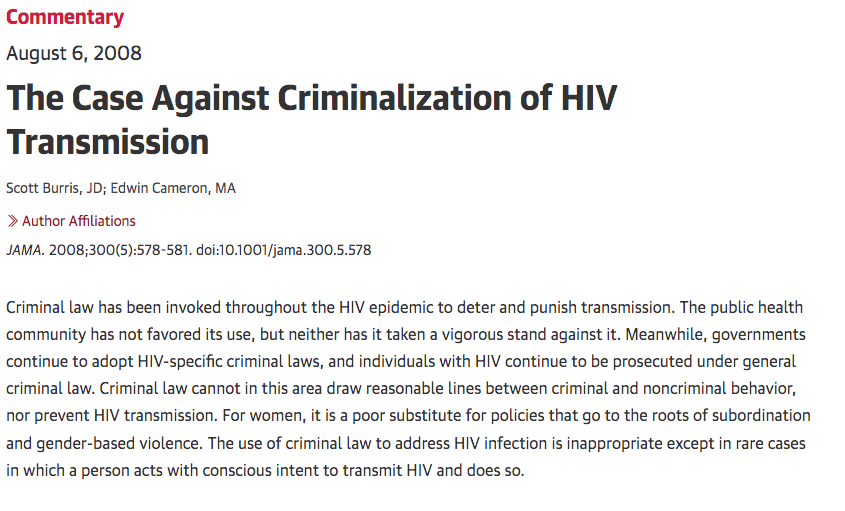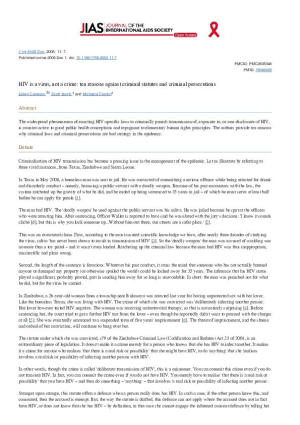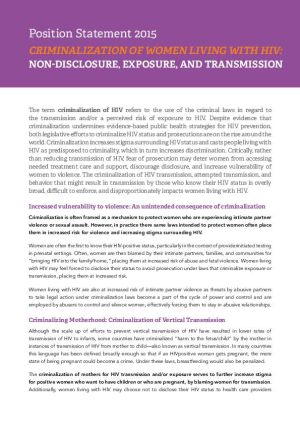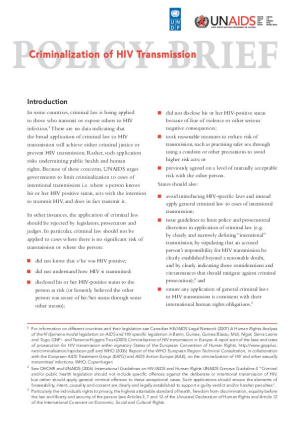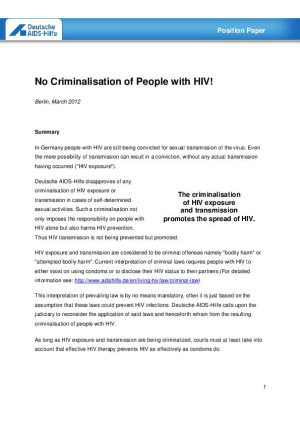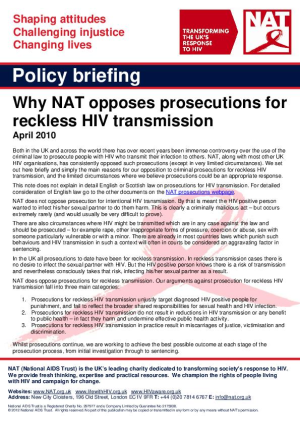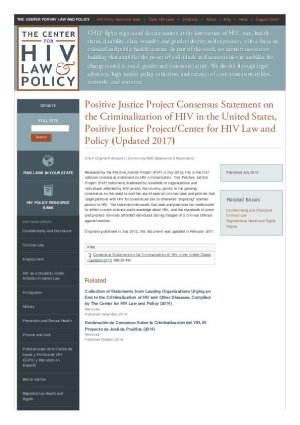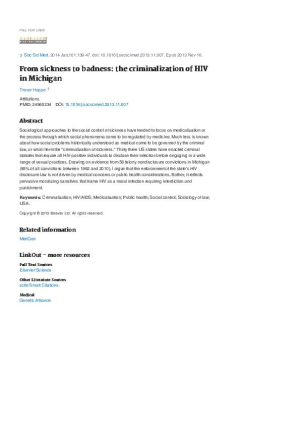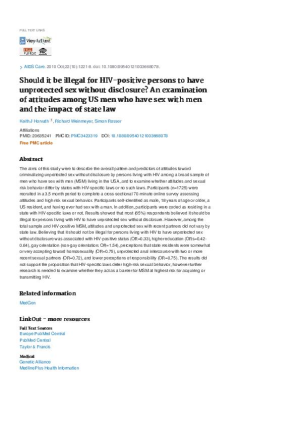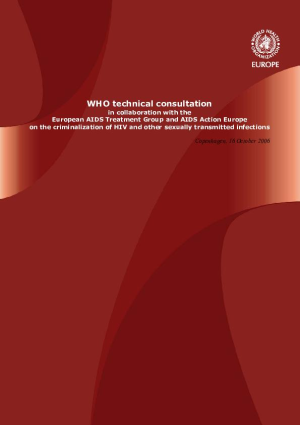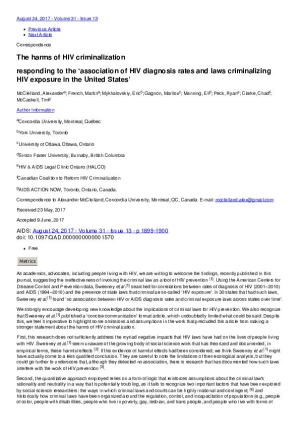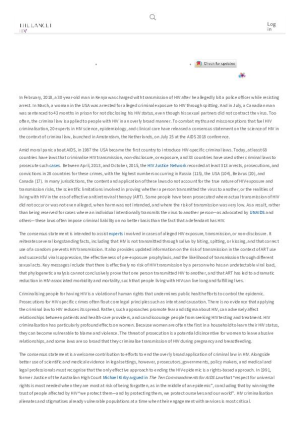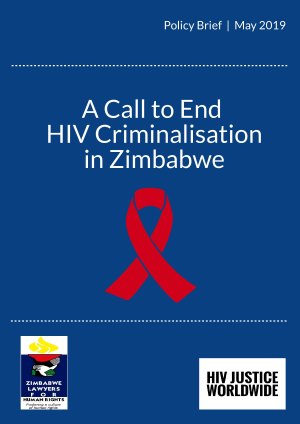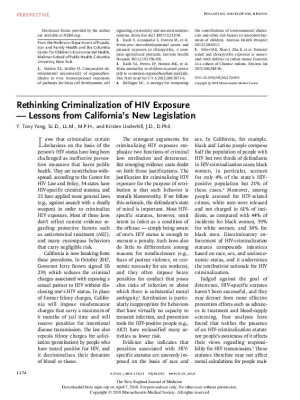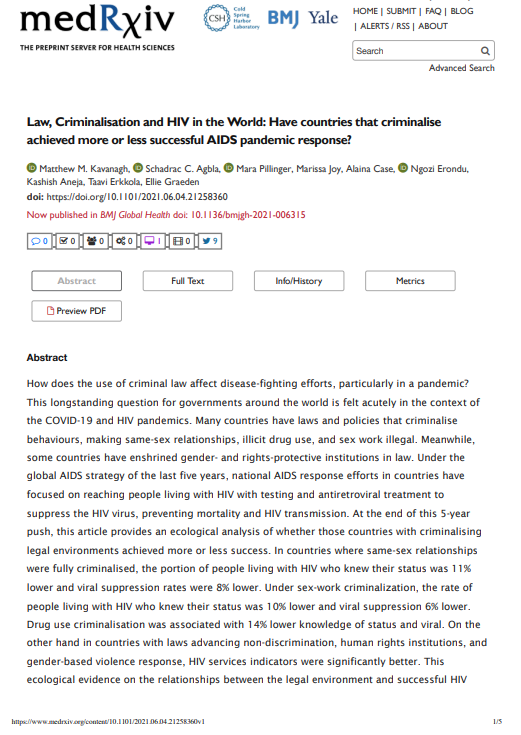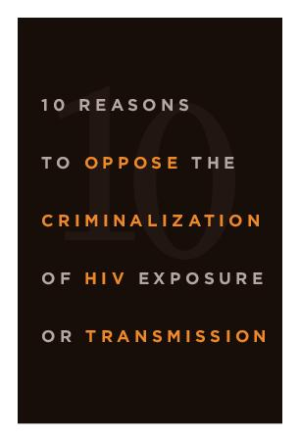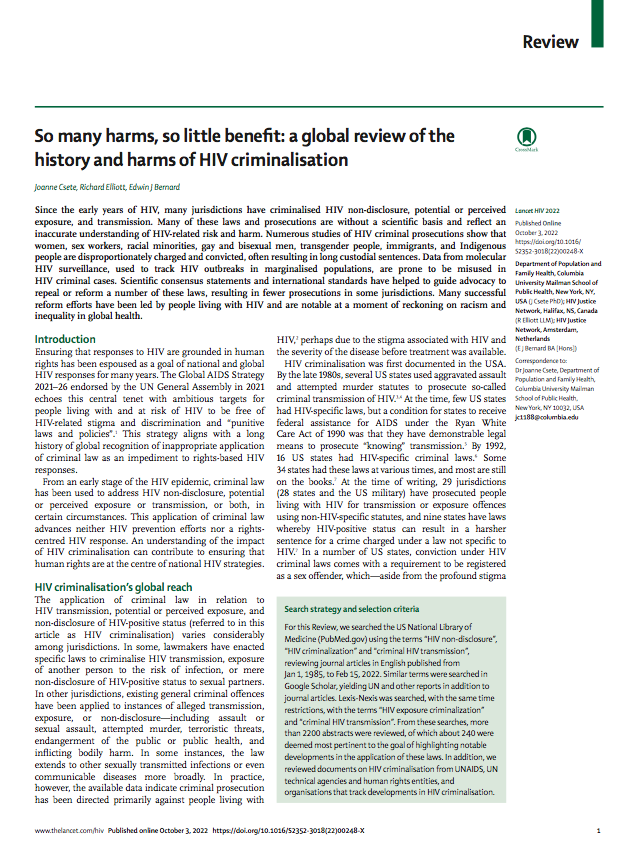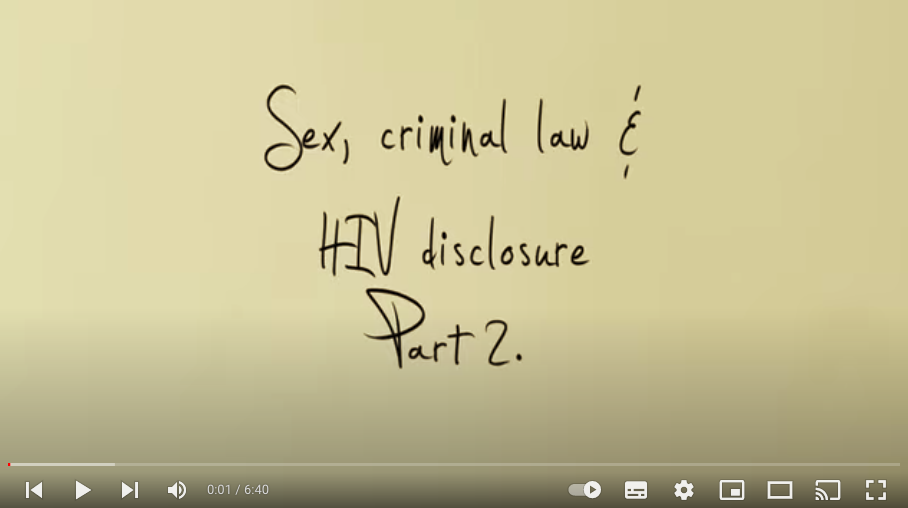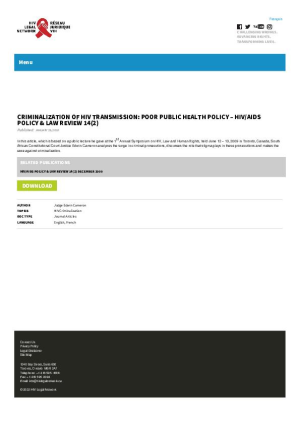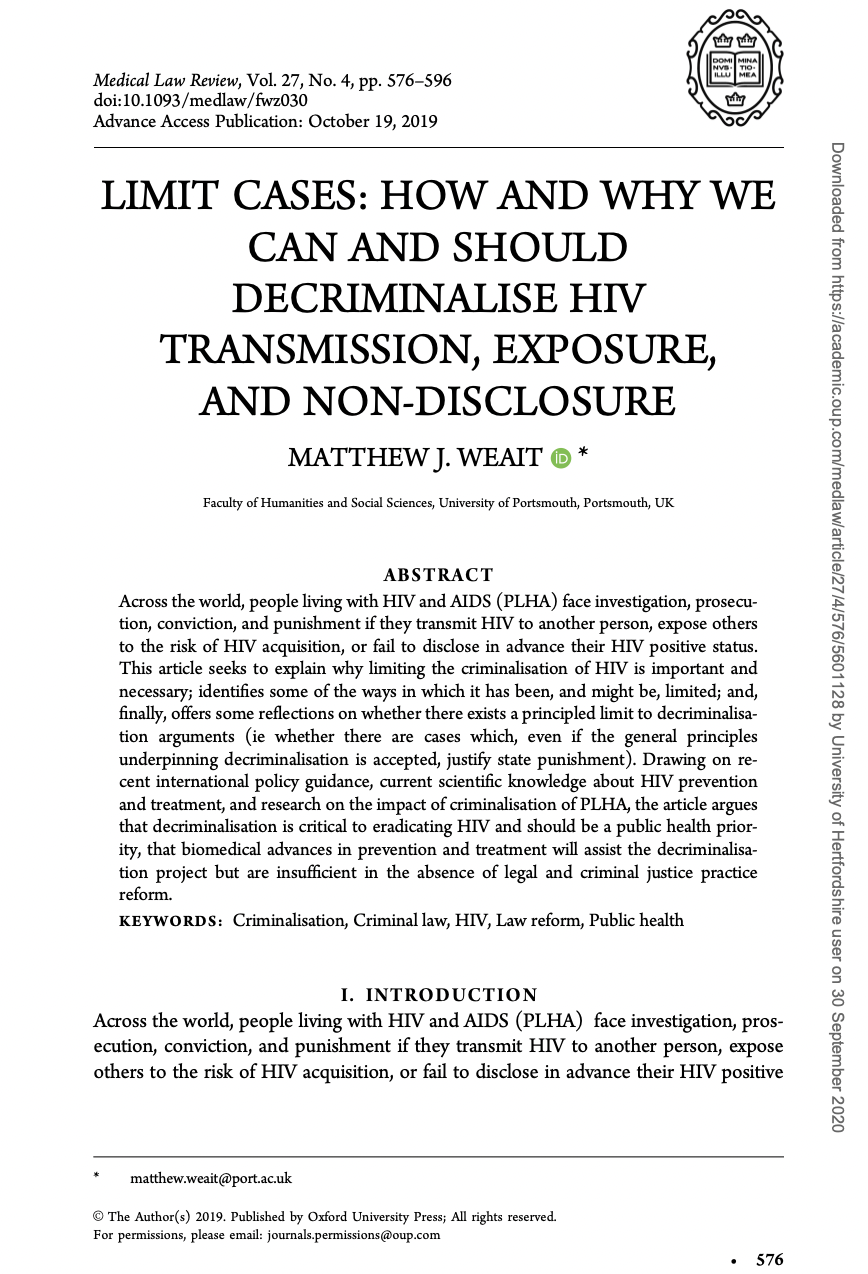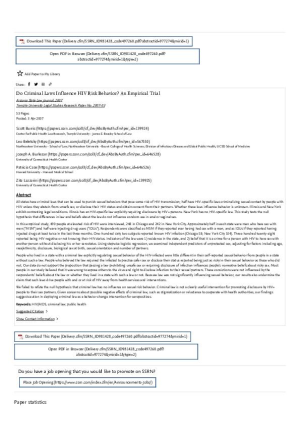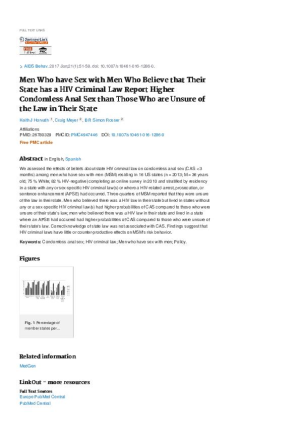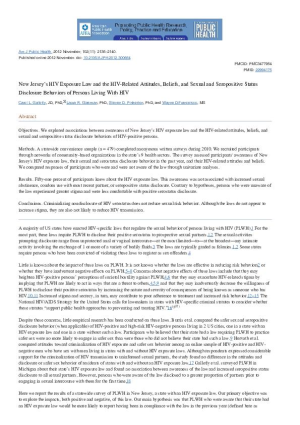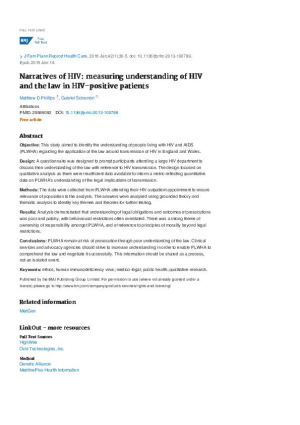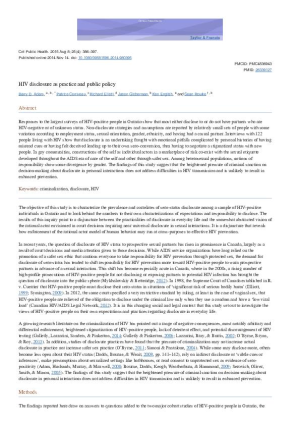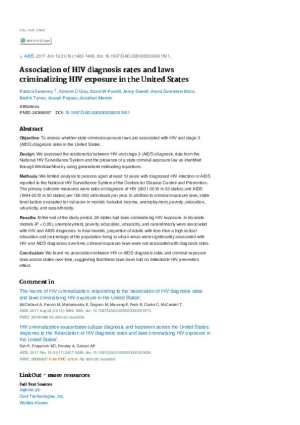Argues that although criminal law has been invoked throughout the HIV epidemic, the public health community has neither favoured its use nor taken a vigorous stand against it. States criminal law cannot draw reasonable lines between criminal and noncriminal behaviour, or prevent HIV transmission. For women, it is a poor substitute for policies that go to the roots of subordination and gender-based violence.
Introduction to HIV criminalisation
Reasons to oppose HIV criminalisation
Criminal statutes and criminal prosecutions in the epidemic: help or hindrance?
Mexico International AIDS Conference 2008 – Closing Plenary Speech by Justice Edwin Cameron. Outlines cases and details many of the problems with criminalisation.
Oslo Declaration on HIV Criminalisation
Outlines the importance of a cohesive, evidence-informed approach to use of criminal law relating to HIV non-disclosure, exposure and transmission. Urges Ministries of Health and Justice, public health officials, policymakers and criminal justice system actors to ensure a proportionate response to HIV transmission risk.
International Community of Women Living with HIV (ICW) Position Statement on Criminalization of Women Living with HIV
Argues that criminalisation of women living with HIV for non-disclosure, exposure or transmission undermines public health strategies and increases risk of violence against women. Includes recommendations.
Criminalization of HIV transmission Policy Brief
Urges governments to limit criminalisation of HIV to cases of intentional transmission. Argues that criminal law should not be applied in a range of circumstances, including where there is no significant risk of transmission.
- Alternative links
- French/Français, Spanish/Español, Russian/Русский
No Criminalisation of People with HIV!
Argues that criminalisation undermines HIV prevention efforts, calls for a clear distinction between moral and legal issues, and calls on the judiciary to reconsider the application of criminalisation against people with HIV.
- Alternative links
- German
Why NAT opposes prosecutions for reckless HIV transmission
Explains the main reasons the National AIDS Trust opposes criminal prosecutions for reckless HIV transmission, and the limited circumstances where prosecutions may be an appropriate response.
Consensus Statement on The Criminalization Of HIV in the United States
The first national consensus statement by (a long list of) U.S. community organisations and individuals, released by the Positive Justice Project in July 2012. The Consensus Statement includes calls for an end to the use of specific laws and to prosecutions where there is no intent to cause harm and current science does not support the likelihood of transmission.
- Alternative links
- Spanish
From Sickness to Badness: The Criminalization of HIV in Michigan
Found that to justify a conviction or more severe punishment, prosecutors and judges often argued that HIV infection was a death sentence; that HIV is a deadly weapon; and that HIV-positive people are homicidal threats - despite fewer than 7% of cases involving alleged infection. Medical evidence was rarely invoked in the adjudication of cases. The study concludes that enforcement of HIV disclosure laws reflects pervasive, moralising narratives.
Should it be illegal for HIV-positive persons to have unprotected sex without disclosure? An examination of attitudes among US men who have sex with men and the impact of state law
Describes the overall pattern and predictors of attitudes toward criminalizing unprotected sex without disclosure by people with HIV. Examines whether attitudes and sexual risk behaviours differ in states with or without HIV-specific laws. Found most respondents believed it should be illegal for persons living with HIV to have unprotected sex without disclosure, however, attitudes did not vary by state law, suggesting HIV-specific laws do not deter high-risk sexual behaviour.
Technical consultation in collaboration with the European AIDS Treatment Group and AIDS Action Europe on the criminalization of HIV and other sexually transmitted infections, Copenhagen, 16 October 2006
Describes the work of the 2006 WHO technical consultation on the criminalization of HIV exposure and transmission, involving participants from all over Europe. Concludes that criminalization of HIV/STI transmission or exposure should be a last resort and only undertaken in a manner consistent with human rights conventions and laws. Argues that criminalization represents a failure of prevention efforts, with greater efforts required to overcome stigma and discrimination that undermine prevention.
The harms of HIV criminalization: responding to the ‘association of HIV diagnosis rates and laws criminalizing HIV exposure in the United States’
Critiques findings from CDC research suggesting criminal exposure laws have had no detectable HIV prevention effect, arguing that by taking account of social science research, even stronger conclusions about the harms of HIV exposure laws are possible.
Countries that criminalise same-sex relationships, sex work and drug use have poorer HIV outcomes
Countries that criminalise same-sex relationships, sex work and drug use have significantly more people with undiagnosed HIV and lower rates of viral suppression than countries that do not criminalise, or criminalise these areas to a lesser extent. Countries with human rights protections in place fared much better than those without on these HIV-related indicators, according to an analysis by Dr Matthew Kavanagh of Georgetown University.
A Call to End HIV Criminalisation in Zimbabwe – Policy Brief
The Brief explains the concept of “HIV criminalisation” and the HIV-related criminal law in Zimbabwe. It describes why it is necessary for the law to be reformed, including why the law violates human rights and is outdated in the light of compelling scientific developments.
Rethinking Criminalization of HIV Exposure — Lessons from California’s New Legislation
Argues that laws criminalising HIV exposure fail to satisfy criminal law functions of retribution and deterrence. Retribution is problematic as laws are applied when no intention to transmit HIV, little to no likelihood of transmission and multiple factors may make disclosure difficult. Laws fail to deter unprotected sex and are a poor fit for acts that include no risk of transmission, including sex and blood donation. Instead, laws cause harm, with discriminatory enforcement compounding injustice and stigma. California’s law reform is commendable, while other problematic U.S. HIV-criminalisation statutes should be restructured, amended, or repealed.
Law, Criminalisation and HIV in the World: Have countries that criminalise achieved more or less successful AIDS pandemic response?
At the end of the 5-year strategy in which countries around the world focused their AIDS response on reaching people living with HIV with testing and treatment services, this article provides an ecological analysis of whether those countries with criminalising legal environments achieved more or less success. It found that countries that have adopted a criminalising approach to key populations saw less success than those that chose not to criminalise. This analysis suggests a new global AIDS strategy that includes a focus on law reform may hold promise in achieving goals that were missed in 2020.
Sexual Behavior, Stigma, Perceived Hostility, Comfort With Disclosure and New Jersey’s HIV Exposure Law
Findings from this study indicate that the law may have minimal impact on the disclosure behavior of people with HIV, and is not an effective structural HIV prevention intervention. The researchers posit that internalized normative values likely guide disclosure, irrespective of the law. As a result, the authors argue that interventions designed "to increase comfort with seropositive status disclosure may be a better way to achieve the desired behaviors.
Unfair criminalization as a threat to epidemic safety
This article aims to raise awareness and stimulate serious discussion of the negative impact of criminal law regulation on the prevention and treatment of infectious diseases, including HIV/AIDS, tuberculosis, and sexually transmitted diseases.
Punishment Without Principle: HIV Criminalization and the Sex Offender Registry
This Article focuses on one especially punitive and underexamined consequence of HIV criminalisation: in six states, individuals convicted under HIV-specific statutes must register as sex offenders, a designation forty other states may enforce through reciprocal registration laws. Although these provisions may survive constitutional scrutiny, they can produce outcomes that are deeply unjust and untethered from any principled theory of punishment.
This Article argues that mandatory sex offender registration for HIV-related convictions cannot be justified under prevailing punishment theories, which require proportionality, harm prevention, and moral condemnation linked to culpability.
Ten Reasons to Oppose the Criminalization of HIV Exposure or Transmission
Provides ten reasons why criminalizing HIV exposure or transmission is unjust and ineffective public policy. Argues criminalization is unlikely to prevent new infections or reduce women's vulnerability to HIV. Instead, criminalisation may harm women and has a negative impact on public health and human rights.
So many harms, so little benefit: a global review of the history and harms of HIV criminalisation
This review shows that HIV criminalisation is a global concern inconsistent with the human rights-based response to HIV espoused in UN strategies for decades, and adds to the legal and societal burden faced by vulnerable populations. It is enabled by laws and a criminal legal system that in many cases have not caught up with the science of HIV. An understanding of the impact of HIV criminalisation can contribute to ensuring that human rights are at the centre of national HIV strategies.
Sex, criminal law and HIV non-disclosure – Part 2
Provides overview of reasons why HIV criminalization is the wrong approach for Canada.
Criminalization of HIV transmission: poor public health policy
Analyses the surge in criminal prosecutions, discusses the role that stigma plays and makes the case against criminalisation.
- Alternative links
- Français
Limit Cases: How and why we can and should decriminalise HIV Transmission, exposure and non-disclosure
ABSTRACT: Across the world, people living with HIV and AIDS (PLHA) face investigation, prosecution, conviction, and punishment if they transmit HIV to another person, expose others to the risk of HIV acquisition, or fail to disclose in advance their HIV positive status. This article seeks to explain why limiting the criminalisation of HIV is important and necessary; identifies some of the ways in which it has been, and might be, limited; and, finally, offers some reflections on whether there exists a principled limit to decriminalisation arguments (ie whether there are cases which, even if the general principles underpinning decriminalisation is accepted, justify state punishment). Drawing on recent international policy guidance, current scientific knowledge about HIV prevention and treatment, and research on the impact of criminalisation of PLHA, the article argues that decriminalisation is critical to eradicating HIV and should be a public health priority, that biomedical advances in prevention and treatment will assist the decriminalisation project but are insufficient in the absence of legal and criminal justice practice reform.
Do criminal laws influence HIV risk behaviour? An empirical trial
Found that people who believed the law required safer sex or disclosure reported being just as risky in their sexual behaviour as those who did not. Most believed it was wrong to expose others to HIV and right to disclose their HIV positive status to their sexual partners. Those beliefs were not influenced by understanding of the law or whether they lived in a state with such a law or not.
Men who have sex with men who believe that their state has a HIV criminal law report higher condomless anal sex than those who are unsure of the law in their state
Found very little variation in the sexual behaviour of gay men living in states with or without HIV specific criminal laws, suggesting legislation has a minimal impact on sexual behaviours. In fact, men who believed they lived in a state with such laws were slightly more likely to have sex without a condom, possible due to a false sense of security – expecting disclosure or protection from the law.
New Jersey’s HIV Exposure Law and the HIV-Related Attitudes, Beliefs, and Sexual and Seropositive Status Disclosure Behaviors of Persons Living With HIV
Explored associations between awareness of New Jersey’s HIV exposure law and the HIV-related attitudes, beliefs, and sexual and seropositive status disclosure behaviors of HIV-positive persons. Found criminalising nondisclosure of HIV serostatus did not reduce sexual risk behaviour.
Narratives of HIV: measuring understanding of HIV and the law in HIV-positive patients
Found PLHIV’s understanding of legal obligations about HIV risk behaviours was poor and patchy, with behavioural restrictions often overstated. PLHIV remain at risk of prosecution through poor understanding of the law.
HIV disclosure as practice and public policy
Found that the increasing criminalization of HIV non-disclosure does not address the complexity of HIV transmission, making it unlikely to reduce HIV transmission.
Association of HIV diagnosis rates and laws criminalizing HIV exposure in the United States
This study assessed the relationship between HIV and AIDS diagnosis data from the (US) National HIV Surveillance System and the presence of a state criminal exposure law by using generalized estimating equations. It found no association between HIV or AIDS diagnosis rates and criminal exposure laws across states over time, suggesting that these laws have had no detectable HIV prevention effect.

